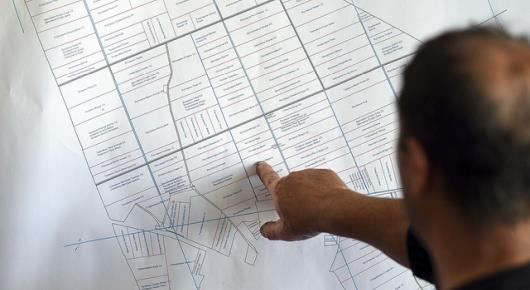Training continues for land consolidation feasibility studies

Geodetic companies working to provide assistance in the Macedonian land consolidation process are receiving special training today in a workshop at the Ministry of Agriculture, Forestry and Water Economy in Skopje.
The training workshop on conducting feasibility studies for ten selected areas with the highest potential for land consolidation is being held for geodetic companies by the European Union-funded Mainstreaming of the National Land Consolidation Programme (MAINLAND) project, implemented by FAO together with the North Macedonian Ministry of Agriculture, Forestry and Water Economy.
The main objective of the workshop is to support the private geodetic companies in developing the skills and knowledge they’ll need to conduct land consolidation feasibility studies in the villages of Logovardi, Opticari, Trn and Zabeni in Bitola Municipality; in Stojakovo in Bogdanci Municipality; in Cheshinovo, Chiflik, Sokolarci and Spanchevo in Cheshinovo-Obleshevo Municipality; and in Carev Dvor in Resen Municipality.
At today’s workshop, participants are learning more about conducting feasibility studies as the first phase in the process of land consolidation. MAINLAND project experts will present land consolidation in the broader contexts of local community development and gender-equitable rural development. Representatives of the geodetic companies and the Ministry’s Land Consolidation Department will also learn more about basic European Union experiences and approaches regarding re-allotment planning, the second phase in the land consolidation process.
FAO land tenure officer Morten Hartvigsen emphasized the importance of the feasibility studies and the solid Feasibility Study Reports as the basis in assessing whether the projects are feasible and, thus, whether re-allotment planning and technical design should proceed. The feasibility study also is the basis for the facilitated negotiations between landowners and farmers that would take place in the re-allotment planning phase.
Today’s training also covers existing gender-based inequalities in access to land and ways forward to ensure that both women and men benefit equally from this process, in line with the country´s commitments towards gender equality. Aroa Santiago Bautista, FAO gender mainstreaming officer, underlined that in order to guarantee that the rights of all are effectively protected during the land consolidation processes, it is essential to ensure that all members of the community are actively engaged and that no one is left behind.
This is the third training session for the contracted geodetic companies on land consolidation. At the end of 2018, the MAINLAND project organized two trainings to prepare the geodetic companies for the start of the feasibility phase in the selected areas with the highest potential and interest for land consolidation. The findings of the first five feasibility studies – for the villages of Carev Dvor, Logovardi, Opticari, Sokolarci and Spanchevo – are expected at the beginning of March 2019. Those studies will show whether land consolidation in these five areas is feasible. If it is, recommendations will be provided for the best land consolidation approach in each area and for the needed investments in rural infrastructure, depending on the needs in each community and on the available budget.
6 February 2019, Skopje, the Republic of North Macedonia
